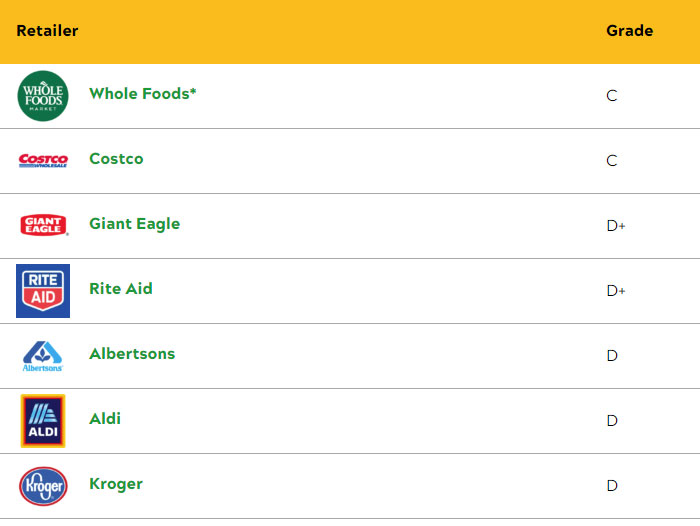New Scorecard Ranks Top Food Retailers on Bee-friendly Policies
October 8, 2020 | 4 min to read

WASHINGTON – Major U.S. food retailer, Giant Eagle, released a groundbreaking new policy making the company the only top retailer to make a clear commitment to reduce toxic pesticide use, according to a new Bee-Friendly Retailer Scorecard released today by Friends of the Earth. The policy commits Giant Eagle to eliminate use of a class of pesticides that is highly toxic to pollinators, called neonicotinoids, in its produce supply chain, taking a first step toward protecting pollinators. Forty percent of invertebrate pollinators like bees and butterflies face extinction.
“Giant Eagle’s new policy is a great first step and is welcome news amidst a worsening climate crisis and what scientists are calling the ‘insect apocalypse,’” said Kendra Klein, senior staff scientist at Friends of the Earth. “Widespread use of toxic pesticides is decimating pollinator populations. We are already seeing shortages in key food crops in the U.S. due to pollinator declines. Food retailers have the power to help stop this by phasing out toxic pesticides in their supply chains. These companies should help growers shift to less-toxic approaches and spur a transition to organic farming, which is healthier for pollinators, people and the planet.”
The scorecard ranks 25 of the top food retailers in the United States on policies and practices related to pesticide use in their food and beverage supply chains. Together, the 25 companies evaluated control $910 billion in food and beverage sales each year. The top four alone — Walmart, Kroger, Costco, and Albertsons — control $519 billion.
In addition to Giant Eagle, in the past year Albertsons, Aldi U.S. and Rite Aid (NYSE: RAD) recognized the need to protect the bees by creating new pollinator health policies that encourage reductions in bee-toxic pesticides, and Kroger (NYSE: KR) expanded its similar policy. Costco (NASDAQ: COST) was the first major U.S. food retailer to establish a pollinator health policy in 2018. Only Giant Eagle’s policy includes a measurable commitment to reduce use of pollinator-toxic pesticides in its food supply chain.
While agriculture accounts for the vast majority of pesticide use, the scorecard also awarded points to nine companies for complimentary policies in their home and garden supply chains, including credit to Costco, Ahold Delhaize (ADRNY: US) and CVS (NYSE: CVS) for commitments to end sales of Roundup and other glyphosate-based products.
The release of these pollinator policies follows a multi-year effort led by Friends of the Earth and allies urging the companies to phase out toxic pesticides use, to support farmers to shift to least-toxic approaches, and to increase organic offerings. The campaign aims to address devastating losses in pollinator populations linked to agricultural pesticide use.
“These days, we’re ever more aware of how brittle the systems that support us are. From coronavirus to climate change, our food system is facing profound threats that could result in bare shelves at the grocery store,” said Klein. “Among these threats is the decimation of the bees and other essential pollinators that are responsible for one in three bites of food we eat. It’s imperative that food retailers step up to protect the small but mighty creatures that their food supply chains depend on.”
Pollinators contribute to over $500 billion worth of annual global food production. Without pollinators, grocery stores would run short of a wide assortment of fruits and vegetables, nuts, beans, and luxury items like chocolate and coffee. And because bees pollinate alfalfa and other feed crops for cows, dairy and meat shelves would be impacted.
U.S. beekeepers lost over 40% of their colonies last year, with the highest winter losses ever recorded. Bees are the canaries in the cornfields, warning of alarming trends in insect loss. The first meta-analysis of global insect declines found that 40% of insect species could face extinction in coming decades, leading the authors to warn of “catastrophic ecosystem collapse” if we don’t change the way we farm. And a recent global scientific assessment warns that the ecological crisis of biodiversity loss is on par with the climate crisis.
Despite this, pesticide reduction lags far behind other sustainability efforts in the food retail sector. While 23 of the 25 U.S. food retailers evaluated in this scorecard have sustainability policies related to energy and climate, just six have a pesticide-related policy as of 2020.
Scorecard grades were assigned based on publicly available information concerning retailer policies and self-reported information concerning retailer practices. Friends of the Earth also reached out to retailers, giving them an opportunity to review their draft score and provide additional information.
Scoring criteria include creating pollinator health policies, tracking and measurably reducing pesticide use in supply chains, expanding organic offerings, and investing in the expansion of the U.S. organic sector. Criteria also include consumer education, advocacy for public policies that shift government support from pesticide-intensive agriculture to organic and other ecological farming systems, and pesticide reductions in companies’ home and garden supply chains.
Over 100 beekeeping, farming, foodchain worker, consumer and environmental organizations have joined with Friends of the Earth to demand that grocery retailers take urgent action on pesticides.
###
Friends of the Earth fights to protect our environment and create a healthy and just world. We speak truth to power and expose those who endanger people and the planet. Our campaigns work to hold politicians and corporations accountable, transform our economic systems, protect our forests and oceans, and revolutionize our food & agriculture systems.
